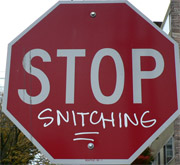 “What the fuck do you think you are doing?”
“What the fuck do you think you are doing?”
While a chillingly familiar phrase to anyone who has dismantled an oily motorcycle engine on a family kitchen table, that’s actually the scolding voice of Madonna preaching to her fans more than a decade ago.
It’s been 12 long years since those infamous words were first heard by shocked would-be pirates of Madonna’s album American Life. But even today the decision to embed the singer’s anger into MP3 tracks on early file-sharing networks makes little sense.
Aggressive lecturing of pirates has never worked and is never likely to. Whether entertainment companies like it or not, pirates are human beings. Talking to them like children and/or thieving scum might be tempting, but befriending, nurturing and entertaining (even through gritted teeth) is a much better strategy.
This week came news of another effort at converting pirates into paying customers, with NoodleCake Studios confessing that it uploaded a special version of its game Shooting Stars! to torrent sites. The game was playable for a while but had an unbeatable boss which preceded a message to support the developers and buy the game.
Of course, these kinds of scheme aren’t new and it’s a path well-trodden by many software developers in recent times. However, what NoodleCake brought to the table this week were huge helpings of honesty and a desire to use inevitable piracy as a point of leverage.
First off, the studio made it clear up front that the whole thing wasn’t designed to piss off Android pirates. It was a straight up and good-humored marketing stunt.
“Being spiteful really isn’t our style to be honest. We know that piracy exists and is an issue, but it is also something that we have just come to accept as part of the digital age,” NoodleCake’s Ryan Holowaty informs TF.
“So instead we thought it would be fun to embrace piracy and see if we could turn it into something positive from a press stand point. The overwhelming response we have gotten from media on this approach has proven the experiment a success, far beyond driving any additional sales via the in-game messaging to purchase the premium version.”
Intrigued by the positive approach to a decades old problem, TF asked the company about its views on people who download their content for free.
“Pirates come in all shapes and sizes and because of that, we don’t classify them as really anything but pirates. Some will become future customers if they like our products, others can be considered a wash and never will purchase anything,” Holowaty explains.
“But even just having someone play our games, be it paid or not, is a small victory in itself. We aren’t here to lecture anyone on the ethicacy of pirating. Instead we wanted to tell a fun story using piracy as the medium.”
And the studio appears to have done just that, thankfully without the kind of aggressive stance employed by Madonna all those years ago.
“I think there is a fine line you can walk and perhaps aggressively calling out fans of your music isn’t the best way to do it. In our case we poke fun at the situation by parodying the music industry and using less aggressive messaging by saying that piracy sucks and if you want, please support us,” Holowaty notes.
“I believe strongly in karma and that the world gives back what you put into it. So if you are throwing vitriol at you fans because they wanted to experience your product, odds are they might send it right back at you. Then you end up in a flame war and no one wants that.”
While refraining from lectures and bitter rhetoric, in the end NoodleCake are pragmatic about their anti-piracy marketing efforts.
“I think doing stunts like we did show that we are aware of piracy but aren’t here to try and change how DRM or anti-piracy policy works in any way. Just like our fans who pay for our games, we want to build a relationship with anyone playing our games, paid or not,” Holowaty adds.
“If even one person buys the game because they appreciated or ‘got’ what we were doing with the fake pirated version, then that is a win for us. I have seen a number of people commenting on the story saying that they purchased the game because of what we did.
“The positive feedback has been kind of overwhelming to be honest,” he concludes.

Source: TorrentFreak, for the latest info on copyright, file-sharing, torrent sites and ANONYMOUS VPN services.

 This week we have three newcomers in our chart.
This week we have three newcomers in our chart.  Back in April, Dutch anti-piracy group BREIN obtained ex parte court orders (defendants didn’t appear) against members of a piracy release group.
Back in April, Dutch anti-piracy group BREIN obtained ex parte court orders (defendants didn’t appear) against members of a piracy release group. With more than 150 million active users per month uTorrent is without a doubt the most popular file-sharing application.
With more than 150 million active users per month uTorrent is without a doubt the most popular file-sharing application. “What the fuck do you think you are doing?”
“What the fuck do you think you are doing?”
 With dozens of millions of active users at any given point in the day the BitTorrent protocol is a force to be reckoned with.
With dozens of millions of active users at any given point in the day the BitTorrent protocol is a force to be reckoned with.